I hadn’t realized it was possible for a place to be so loud I lost my sense of taste before we came to the food stall on the Ulitsa Bajzho. It was just one stall in a whole street of them, so cramped that we crowded around a counter hanging out over the street to shove shrimp-stuffed pelmeni, octopus soft buns, and little rice-paper packets of roe from some unidentified fish into our mouths from a communal platter (trough, more like).
The boundary between the stall and the street was blurry. Bodies, smells, heat, and dampness from the street edged into the buildings and our bodies hung out. Fingers from outside reached up blindly, hoping to snatch away a bit of food, and were slapped by the swift fan of the woman directing people to emptying spots at the counters with the fan in one hand and a knife for chopping octopus in the other.
There was much to stare at here, but her act was by far the most transfixing.
“Tyotya, do you ever hit the octopus with the fan and the thieves with the knife?” I shouted over the din.
She snapped the fan open and waved it like the air deserved a beating. “I don’t hit the octopus with the fan,” she said, and I was delighted enough I almost moved to within arm’s reach of her.
“This food is so good! Do you cook all of it yourself?”
“Of course not!” she shouted. “I just do the chopping.” She tossed a basket of sliced octopus down the line, and a man who was so wet I couldn’t tell if he was sweating or had just walked in from the rain stuck his hand up and caught it without looking.
“You do beautiful chopping,” I shouted.
She grinned, eyes rolling up at the ceiling. A piece of octopus flipped up on her blade and then flew across the shop at me. I put up my hand to catch it, but before I could, a quick hand from the street snatched it out of the air.
“Hey!” I just stopped myself from letting myortva go after the thief, and the woman’s knife cut empty air behind them as they disappeared into the warm-glowing rain.
The whole world seemed to glow the red of the paper lanterns in the rain.
“Bad luck.” The woman shrugged, her knife hanging in the air only half a second before it went back to chopping.
“Can I get another piece?” I called.
She flipped a piece of octopus into her own mouth.
“Tyotya!”
The sharp scent of yasno under my nose pulled my attention away, and I looked down in time to see another sweaty man (the woman did not seem to sweat at all, but perhaps that’s because she had a fan) delivering a jar into Sanya’s hand.
“That got your attention,” he said.
“What, I was talking to that tyotya. We’re supposed to be talking to people, right?”
“About what they’ve heard, not about octopus.”
“I have to work my way up to it, don’t I? If I just go around asking people what they know about me, they might get suspicious. But did you know there’s a yasno named after me, Sanya? Greshnyj Iyu. I thought it was a joke at first, or maybe there was some other Iyu I didn’t know about who was significantly more wicked than me.”
“Lower your voice,” Sanya said.
“No one can hear me; I have to spit in your face just so you can.”
“It’s already so loud.” A brief hint of pain crossed his stoic face.
I mouthed “sorry” just as the octopus woman gestured for two newcomers to join us. They bellied up to the counter at my elbow, and the already loud teahouse became deafening.
I gave a cramped wave and a smile, and they returned the gesture truncatedly. They made quick work of the few remaining buns in the basket nearest them and had to wait for the wet man to bring another batch. While they waited, there was nothing for them to do but talk.
“I’m sorry I’m late,” the one using my side like an armrest said. “It took me an hour just to get past the gates.”
“That quick was it?” The man on his other side had a big voice, round and jovial, which was good because it meant I could hear him over the public roar. “The man who brings me unspun wool was stuck at the gate overnight last week.”
“I came around to the north gate because I heard the south one was closed and the west gate was backed up almost to Belinskij. Could’ve been stuck there a whole week. Instead it only cost me an extra ten hours or so to get around to the north gate.”
“I guess you didn't see anything south of the river, then?”
“No, what’s south of the river?”
“Well, I haven’t seen it myself,” the man on the other side said, his voice croaking on the end like he was stretching, enjoying the conversation. “But I’ve heard if you’re not a volshebnik, you’re not getting in or out of there for anything. Even if you are a volshebnik, if you’re not the right kind of volshebnik…”
“What do you mean?”
“They’re not letting foreigners in anymore, are they? Not into Whitecap, not for any reason. There was this business with a group of Akassiyan volshebniks who tried to come into the city just a few days after it happened. They hadn’t even heard of it! They were just returning to the ship that brought them to Khorizova, but they were held and investigated for nearly ten days.”
“I hadn’t heard about that.”
“You’re not the only one. The only reason I know is because of my Akassiyan cotton contacts, you know. Oh, they were in a panic, convinced Knyaz Lev would never let any cotton pass through these borders again after how Knyaz Aksana treated his nieces and nephews.”
“Surely not.”
“No, my friend, I’d not sound so cheerful now if I thought the situation would remain so dire. We’re likely to lose some money in the short-term, of course, but no, this situation won’t last long.” A big mitt of a hand batted the air in front of them. “Vadim Ivanovich will be taking over for his father, and well, he’ll settle things here. His son is Knyaz Aksana’s nephew—I mean her direct nephew. She doesn’t have the best luck with nephews ha ha ha.”
This man was more circumspect than most.
We’d been in Whitecap City since the morning, and we had only made it through the gates because Shenyechka knew someone in Kanbas who could forge us papers. (Of course he did. I remembered the documents he showed that erstwhile volshebnik patrol.)
Lara’s headscarf kept my most easily identifiable features out of view, but I was not so adept at wrapping myself up as she was, and as the day wore on and the wrap got looser, lifting my chin might expose the spot where the knife had first plunged into my throat.
I tried to turtle my neck into the shawl whenever anyone looked closely at me, but Sanya told me I looked even more suspicious when I did that.
The talk on the streets did not sound great for Aksana, and I didn’t know how to feel about it.
The feeling here, in Whitecap, seemed to be that Aksana could have had nothing to do with killing Knyaz Ivan but that it was almost worse she hadn’t. She’d be blamed anyway, Khorizova would be blamed anyway, and it was a weakness, wasn’t it, for her to have allowed Knyaz Ivan to be killed here, on Khorizova soil? She’d been hanging on by a thread for too long, ever since that business with—well, you know, that boy.
What, you mean the nephew? Greshnyj Iyu?
Well yes, but you know I don’t like to say the name.
Do you think he’s going to descend on you if you say his name out loud?
You say it as though it’s so far-fetched, but they say they’ve seen him.
Seen him? Who says?
Don’t act like you haven’t heard it.
No, I don’t pay attention to idle gossip. Volshebniks still die. They can die. They don’t come back to life.
How do you know?
If they could come back to life, don’t you think old Semyon Moryakov’s bones would be up clattering around this city? Don’t you think Isaak Semyonovich would have clawed his way up from the bottom of the ocean to take back his throne from his upstart niece?
(That they felt comfortable saying such things in the city without fear of Aksana’s spies struck me like a ball peen hammer at the base of my spine.)
Anyway, just because they used to die doesn’t mean they do anymore. You’ve seen what they look like. Knyaz Aksana is my age! Sure doesn’t look it. She looks younger than she did twenty years ago. All I’m saying is who knows what happened twenty years ago in the first place? They say he died but it’s convenient he killed himself before he could be executed, isn’t it? That way no one saw him die. Who, besides those volshebniks, saw the body?
So Knyaz Ivan kept him alive just so the boy could kill Knyaz Ivan later? Think before you talk! What kind of sense does that make?
Who said anything about Knyaz Ivan?
Well, whose jail was he in, genius?
There were all kind of volshenbiks there, any one could have gotten to him.
Oh, and you know because you were there?
No, I know because I know.
And so on, and so forth. Thus the gist of the popular narrative on the streets of Whitecap City.
It wasn’t what everyone was talking about, not even most people, but it was being talked about. Other popular opinions were: Aksana did in fact do it herself, Ivan was encroaching and she had to get rid of him to secure her own power; Ivan was not dead but was pretending to be to test the other knyazes and his own people’s loyalty; Greshnyj Iyu had nothing to do with it and was only used as a bogeyman by Knyaz Ivan himself to control (again) the other knyazes and his own people. I even heard one woman argue that there was nothing so greshnyj about Greshnyj Iyu at all; what had he ever done that was so wicked? Teach miryanins Tajna? Even if it was a lie, what was so bad about trying?
Well, his lie got thousands of people killed, was the rebuttal deployed against that and an arrow through the kite of my heart that had just begun to catch air. His lie got thousands of people killed, and he’s the one responsible for the state of things now, isn’t he?
The people having that conversation disappeared into a private home before I heard what the state of things now was, exactly, and Sanya caught my collar when it looked like I might try to follow them through the locked door anyway.
Now, at the end of the day, we walked through the rain searching for a room in which to spend the night. I had snagged an unattended umbrella at the food stall for us to use, but as I struggled to open it, Sanya took it out of my hands and held it over both of us.
I looked up. “You don’t have to hold the umbrella for me; you’re not my servant.”
“I don’t mind,” he said. “It helps hide your face.”
“It’s like a bullseye over me. And look, your hair is getting wet.”
“It’s already wet.”
“I miss your braids,” I said. “You look different without your braids.”
He ran his hand over his hair, shedding water droplets.
“It’s not bad, just different. Well, you do look shorter without them.”
“I’m taller than you are.”
“No you’re not.”
“I am.”
“You’re not; look, we’ll measure right now.” I stopped in the middle of the street, determined to prove it—I knew we were the same height, we’d always been the same height since the very first time we met in Gorakino, it was one of the chief things I liked about us—but Sanya kept walking, still holding the umbrella over where I should have been.
I ran to catch up. “You’re scared to measure because you know I’m right.”
“Okay, Iyu.”
It was warmer beside him. He always radiated heat, like there was a fire forever burning in his belly.
“Let me carry the umbrella; your arm must be getting tired.”
“Can you hold it high enough to cover my head?”
I punched him in the shoulder.
He caught my hand and it held it there for just a second, long enough to turn my face red.

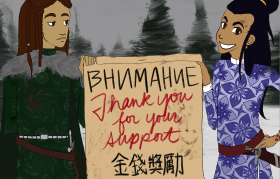
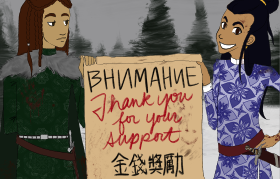
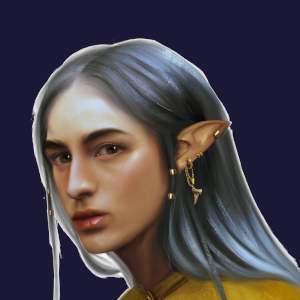
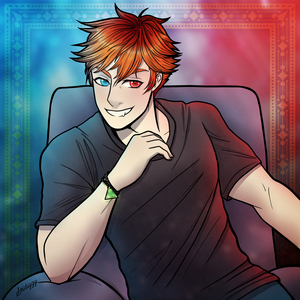







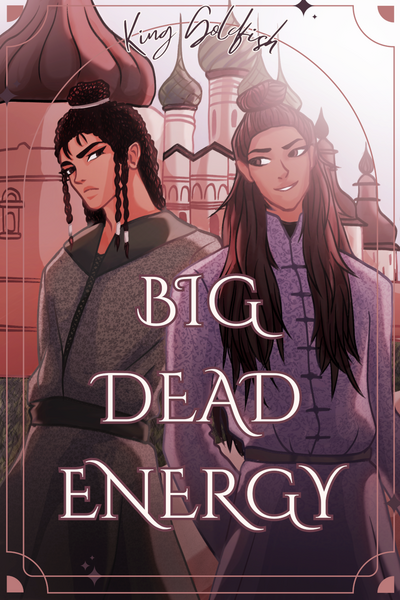
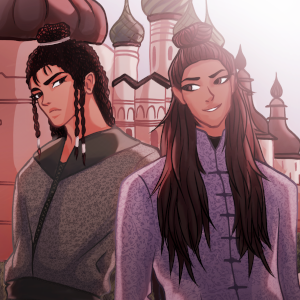
Comments (10)
See all